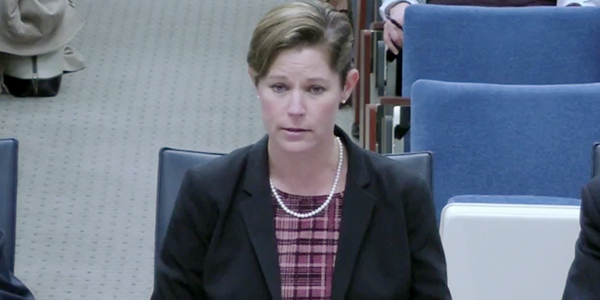By Holden Mann
FERC on Thursday approved NERC reliability standards affecting transmission system planning performance and communications cybersecurity, while also proposing to streamline the ERO’s list of requirements.
Protection System Preparedness
The first standard approved at FERC’s open meeting was TPL-001-5, which NERC proposed last year because of concerns that TPL-001-4 does not provide a means for addressing single points of failure in protection systems (RM19-10). In 2009, NERC reported that such failures had caused three significant system disturbances in the previous five years. (See “Single Points of Failure,” FERC OKs Cyber Reporting Rule.)
FERC said the new standard also addresses its concern that the earlier standard’s six-month outage duration threshold could exclude planned maintenance outages of significant facilities from planning assessments.
Under the new standard, planning authorities and transmission planners will be required to perform annual planning assessments on their part of the bulk power system, considering a range of system conditions and contingencies with a risk-based approach. Possible incidents are organized by likelihood, with more common scenarios referred to in the standard as planning events, and less likely ones called extreme events.
For planning events, entities would have to develop corrective action plans (CAPs). A CAP is not needed for extreme events, but entities must still conduct an analysis to identify potential impacts and mitigation measures. The standard also requires entities to assess the impact of the unavailability of long lead-time equipment.
“Addressing single points of failure on the protection systems, when identified in routine system evaluations, will help prevent N-1 transmission system contingencies and those results from single points of failure from causing unreliable operations,” Leigh Anne Faugust, of the Office of General Counsel, said Thursday during a presentation on the revised standards.
The commission decided not to require NERC to develop CAPs for single points of failure combined with three-phase faults, saying the probability of such an event “is low enough that it does not warrant being a planning event.” Although there have been an average of one three-phase fault event every three months since 2011, only 10 were accompanied by such protection system failures.
The standard will be effective in 36 months, with another 24-month period allowed for entities to develop CAPs addressing commonplace scenarios.
Cybersecurity Scope Expansion
The critical infrastructure protection (CIP) standard, CIP-012-1, was proposed last year in response to FERC Order 822 to address the cybersecurity of real-time communications (RM18-20). (See FERC Proposes Revisions to NERC CIP Standard.) Entities will be required to protect the confidentiality and integrity of real-time assessment and monitoring data transmitted between BPS control centers.
Order 822 originally directed NERC to identify the types of data that must be protected under CIP-012-1, but in the presentation, Faugust said industry comments in response to FERC’s Notice of Proposed Rulemaking convinced the commission that this requirement was unnecessary.
But the commission told NERC it must further refine the standard to require protections regarding the availability of communication links and data as required by Order 822. The commission said it did not agree with NERC that such a requirement would be redundant.
“The reliability standards cited by NERC either do not apply to communications between control centers or do not create an obligation to protect the availability of data between control centers,” FERC said. “We conclude that the risks associated with losing the availability of either data or communication links between bulk electric system control centers is supported by the existing record and warrants a directive to modify the CIP reliability standards.”
The standard will take effect April 1, 2022, to allow time for implementing the new controls.
NOPR to Retire Requirements
FERC also gave preliminary approval to retire 74 reliability standard requirements that were found under NERC’s Standards Efficiency Review project to “either provide little or no reliability benefit, [be] administrative in nature, or relate expressly to commercial or business practices, or are redundant with other reliability standards” (RM19-16, RM19-17).
In response to a question from Chair Neil Chatterjee, Faugust said FERC was “not concerned” about the possibility that retiring the requirements would pose a risk to the BPS.
NERC had submitted three additional requirements for removal on the grounds of redundancy, but FERC’s NOPR would remand VAR-001-6 Requirement R2, which “requires transmission operators to schedule sufficient reactive resources to regulate voltage levels under normal and contingency conditions.” The commission observed that this is the only requirement that “explicitly [addresses] reactive resources.”
Decisions on the other two, FAC-008-3 Requirements R7 and R8, have been postponed as FERC seeks additional information from NERC. The commission said that “NERC’s petition does not address … elements of Requirements R7 and R8 that do not appear to be redundant,” in particular the mandatory exchange of facility rating-related information with transmission owners. If this mandate is not provided by other requirements, then the proposed retirement could prevent TOs from using accurate information in their planning models, FERC said.
Comments on the NOPR are due 60 days after its publication in the Federal Register.
Ongoing Action
In approving the items, FERC emphasized the importance of adapting to an evolving landscape of hazards.
“None of this is static. We’re constantly looking and need to keep looking at what’s changing, what needs to be updated, [and] what needs to be discarded because it’s no longer needed,” Commissioner Bernard McNamee said. “I think that’s something that we should all be proud of, that … we’re constantly looking at things. I know how hard NERC’s working on it, how hard you all are working on it, and I know the three of us are concerned with these issues.”





